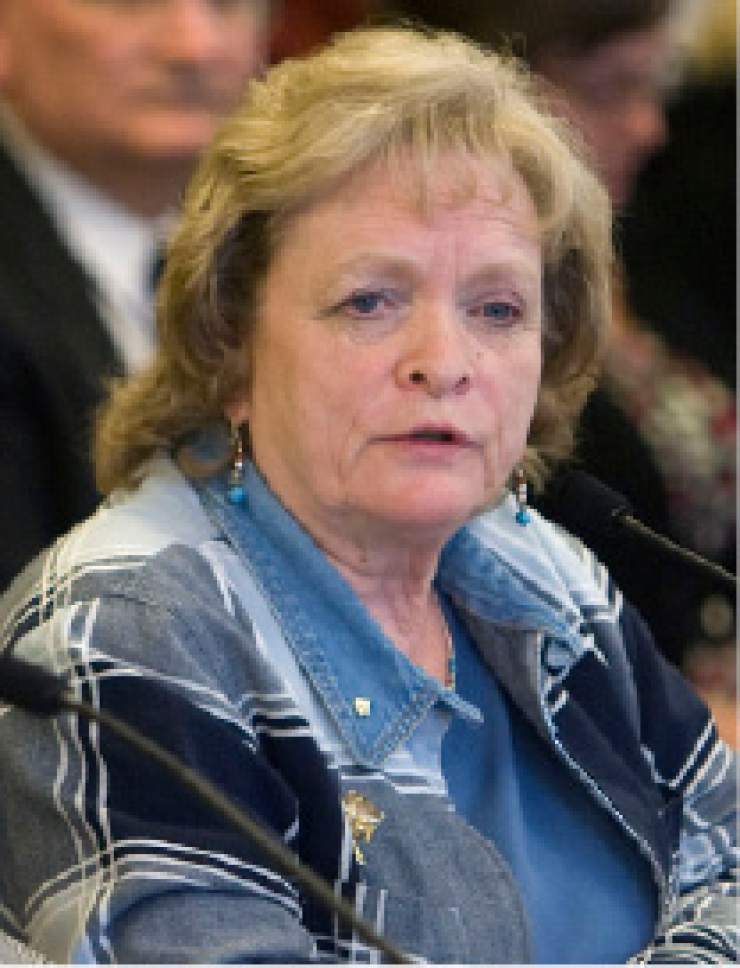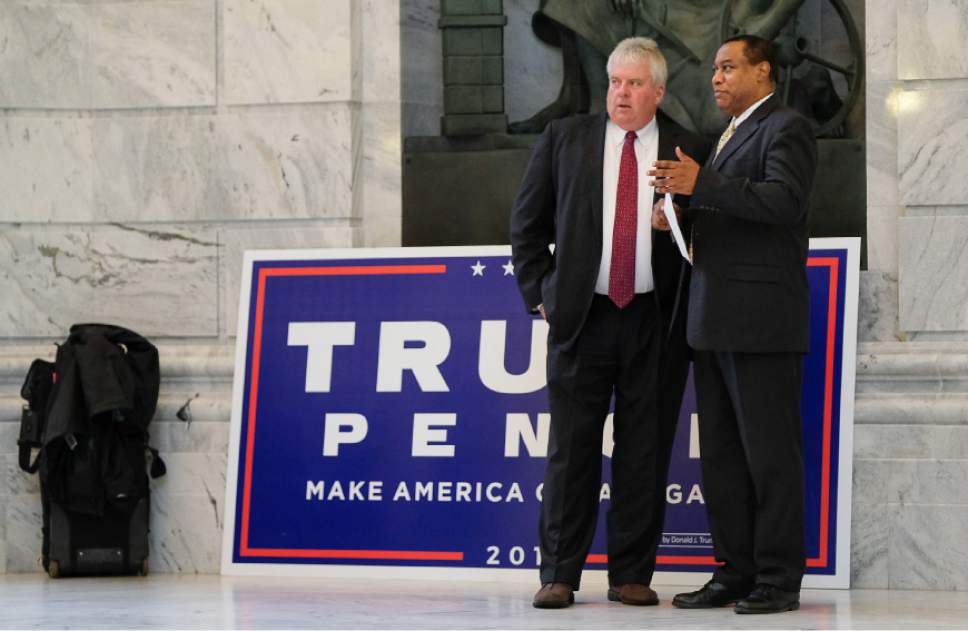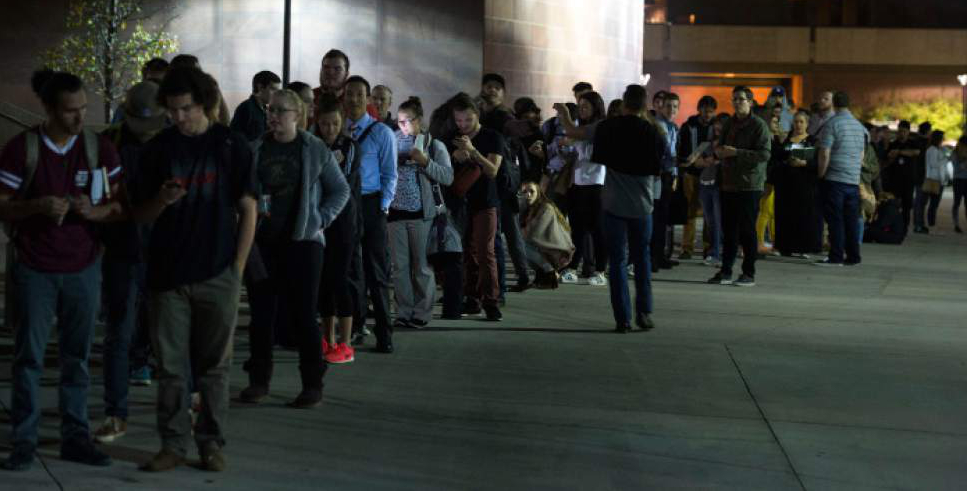This is an archived article that was published on sltrib.com in 2016, and information in the article may be outdated. It is provided only for personal research purposes and may not be reprinted.
Donald Trump's shocking election victory last week relied heavily on motivating most reliable Republican voters to go to the polls for him. But he significantly underperformed among the GOP's most tried and true voters — Mormons.
Nationally, Trump received 61 percent of the vote from members of The Church of Jesus Christ of Latter-day Saints, the strongest support among any religious demographic except for Evangelicals, according to exit poll data from the Pew Research Center.
But it was a significant decline from 2012, when 78 percent of the Mormon faithful cast ballots for fellow church member Mitt Romney, and an even bigger drop from 2004, when 80 percent of LDS voters backed George W. Bush's re-election.
Mormon voters' discomfort with Trump was even more pronounced in Utah.
According to the Utah Colleges Exit Poll, which surveyed thousands of voters, Trump managed to win support from fewer than 45 percent of Mormon voters — barely half of Romney's performance with the voting bloc and 30 points lower than John McCain received in 2008.
"Within the church, just like all churches, we are taught to vote for moral and wise men and women, and the word moral just didn't stick with Trump," said Gayle Ruzicka, president of the conservative Utah Eagle Forum and an outspoken opponent of Trump's candidacy.
The latest vote tally — tens of thousands of ballots remain to be counted — had Trump capturing 46 percent of Utah's popular vote, Democrat Hillary Clinton, 28 percent, and independent candidate Evan McMullin, 21 percent.
The exit polling found that many Utahns, even those who ended up voting for him, shared Ruzicka's doubts about Trump's character.
Just 14 percent of Utah voters said that Trump is a good role model for young people, fewer than half the 31 percent who considered Clinton a good role model. Sixteen percent said Trump is a moral person, compared to 25 percent for Clinton. He was considered more honest and trustworthy than Clinton by a margin of 24 percent to 19 percent.
Mormons who identified themselves as "very active" were more likely to break with Trump and vote for McMullin. Trump fared better among "somewhat active" and "less active" Mormons, while Clinton fared best with non-Mormon voters.
Much was written during this election about LDS discontent with Trump, based on his personal behavior and his rhetoric regarding immigration and excluding Muslims from the country — both policies that don't square well with the Utah-based faith.
The Utah Colleges Exit Poll, a collaborative survey among Utah's institutions conducted in each election, took thousands of surveys of voters who cast ballots both by mail and in person at their polling places. This year, the group surveyed 14,613 voters, giving the poll a margin of error of plus-or-minus 1 percentage point.
The fact that Trump underperformed so dramatically in Utah compared to the rest of the country probably had less to do with differences in the way Mormon voters outside of Utah viewed Trump, but more to do with McMullin's perceived viability as an alternative to Trump in Utah, said Quin Monson, a Brigham Young University professor who co-wrote a book, "Seeking the Promised Land," about the political allegiances of LDS voters.
With McMullin, who is Mormon, was born in Utah and graduated from BYU, not available as an option in most states (he was on the ballot in 11 of them), Monson said Latter-day Saints outside of Utah likely held their noses and voted for Trump.
"It's not that their reaction to Trump was any different," Monson said. "The electoral context was very different."
Don Peay, the Trump campaign's state director in Utah, said he doubts the accuracy of the numbers from the exit polling. He said that, as he traveled the region campaigning for Trump, Mormons in Arizona, Idaho and Nevada had a "totally different opinion about Mr. Trump."
"Clearly the epicenter of the anti-Trump movement in the country was in Utah, and it was led by Mitt Romney and whoever it was who propped up Evan McMullin, so that had an effect," Peay said. "The people who really figured out what was going on voted for the issues, and Trump lines up on the issues 95 percent of the time [with] basic Utah and Mormon beliefs — limited government, local control, strong national defense and individual responsibility."
Ruzicka said that people she talks to were simply turned off by Trump's bragging about his mistreatment of women, which he then dismissed as "locker-room talk." She said before the election she asked one friend, a Mormon bishop who was considering voting for Trump, if he could stand in front of his ward and tell the young people he voted for Trump, and he decided he couldn't.
"The LDS people really struggled. It is difficult in many ways just because of not wanting Hillary," Ruzicka said.
"It's very hard to cast a vote for somebody [like Trump] when you grow up in an atmosphere where women are treated with respect," she said. "The types of things that he said and did about women, the way he demeaned women, that just doesn't sit well with LDS people."
Ruzicka said she ended up not voting for Trump, but wouldn't say who got her vote.
Peay said that four years from now, once Trump has a track record to run for re-election, he'll be back in the 80 percent range in terms of Mormon support.
"My one question for people to think about," Peay said, "would be to think about the notion and concept of 'forgive and forget.' "
Twitter: @RobertGehrke







